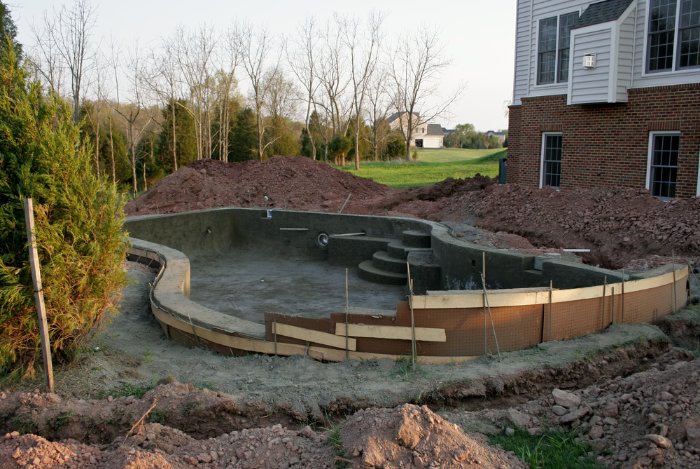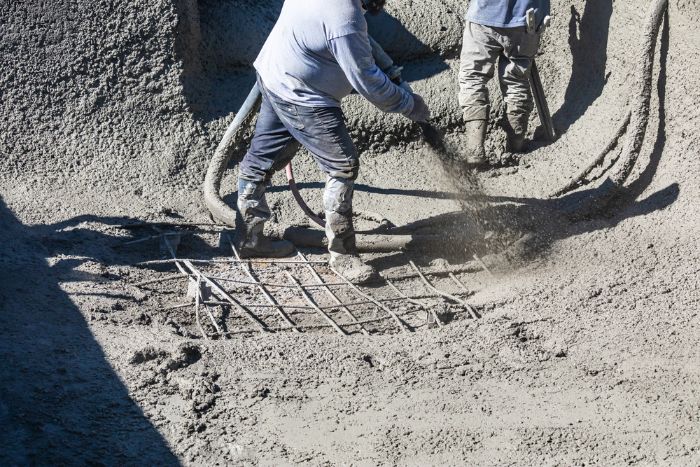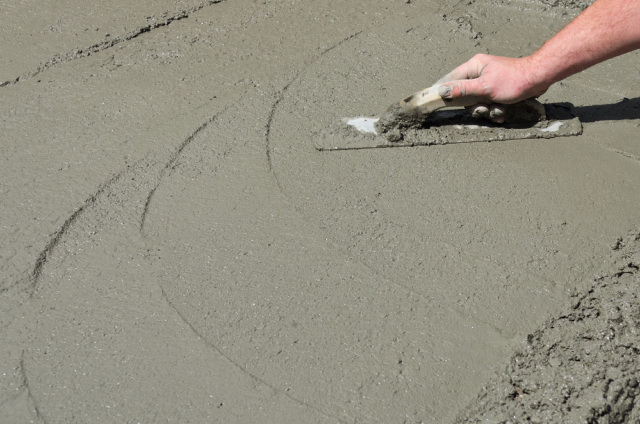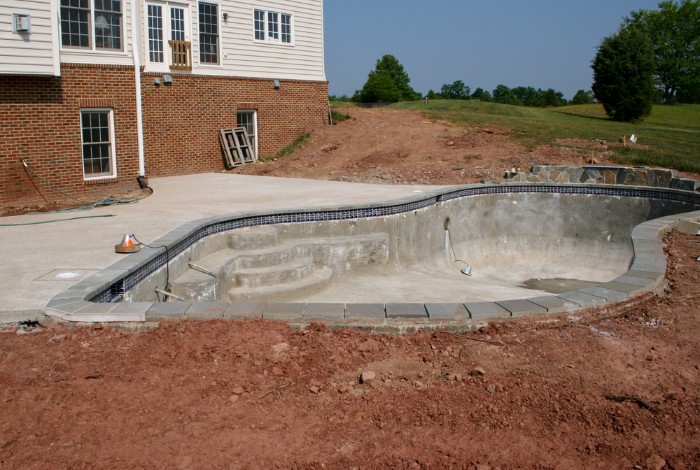Are you looking at installing a high-quality in-ground concrete pool at your home and curious about shotcrete vs gunite pools? Let’s dive into the differences between shotcrete and gunite pools and look at the pros and cons of both.

Shotcrete is concrete that is pre-mixed, loaded wet, and is best for pools that need to be completed quickly. Gunite is loaded dry and gets mixed with water once it’s being sprayed, producing a very strong pool with a smooth finish.
Concrete Vs Shotcrete Vs Gunite – Are They The Same?
Shotcrete and gunite are both types of concrete. They both are a mix of cement, sand, aggregate, and water. They essentially are just different ways or methods to apply concrete, but they also create a slightly different result when it comes to the pool as a finished product.
Both shotcrete and gunite are good choices for your concrete inground pool. They both need to be installed by trained professionals, and if you want a custom pool, a concrete one is what you will be looking at.
Shotcrete and gunite have similarities and differences, but first, let’s discuss what these methods entail.
Firstly, What is Concrete?
Traditional concrete is a mixture of aggregate, sand, water, and powdered cement, which gets used while it’s wet and it hardens over time. It is a commonly used construction material that is used all over the world.
Back in the day, concrete for pools would be poured and cast in place and need to be compacted. The concrete would come from a ready-mix concrete truck and go down the chute or line pump to be used for the pool.
Nowadays, the use of high-pressure hoses makes applying concrete a more popular and effective method. This, in turn, makes shotcrete and gunite top choices of in-ground pools to have at residential homes and commercial properties.
What is Shotcrete?

Shotcrete is a pre-mixed concrete loaded wet and projected at a high velocity through a hose. The compressed air makes the shotcrete stick as it is “shot” quickly in place.
It’s the most popular concrete for inground swimming pools today.
What is Gunite?
Gunite is also applied using a high-pressure hose, but the concrete gets loaded dry and mixed with water at the nozzle when spraying. This makes the ingredients mix at the final moment.
The Differences Between Shotcrete and Gunite Pools
Concrete pools are made from either shotcrete or gunite. While both materials are durable and long lasting, the way they are mixed and poured are different, which is where the cost differential comes from.
The main difference between shotcrete and gunite pools is how the concrete is applied. Shotcrete is loaded into the hose already mixed and wet, whereas gunite is loaded dry and is mixed with water only once it is coming through the end of the hose.
These different methods of concrete application create slightly different results that can determine whether you choose shotcrete vs gunite swimming pool to have at your home.
A Pool Builder’s Perspective
To get a better understanding of the differences, I spoke with Jim Batts, the owner of The Batts Company, a well known and respected pool builder in Jacksonville Beach, Florida. Mr. Batts has been in business since 1977 and has built swimming pools all over Florida and in Central America.
I asked Mr. Batts about the advantages of using gunite from a builder’s perspective and he said that “gunite is mixed at the high pressure nozzle while shotcrete is mixed at the cement plant and poured into the cement truck.” From a builder’s perspective, gunite is better to use and he gave me a couple of examples.
“If the cement sits too long in the cement truck because it cannot be poured due to a rain storm for example, it can start to dry, and water will need to be added, which can weaken the shotcrete”, Mr. Batts said. “However, with gunite, you mix it at the nozzle which means that if it rains, you can stop what you are doing and start again once the storm passes without the gunite hardening up.”
These are great vantage points from an expert contractor that the consumer should consider whenever they are deciding whether to use shotcrete or gunite. Gunite makes for a harder and more durable finish, and gives the contractor flexibility when building the pool.
Shot Crete Has to Be Used Quickly
Once concrete is mixed, there is a time limit for it to be poured, or else it will prematurely harden. Once shotcrete is in the mixing truck, the clock is ticking. Gunite doesn’t finish the mixing process until it reaches the nozzle, which ensures that the gunite is mixed perfectly before being applied to the pool foundation.
Gunite Lasts 100 Years
In terms of a long-term investment, gunite pools are worth the extra cost because you can be sure you’re getting a quality product that the contractor has more control over, so the overall product will be better, Plus, with a 100 year shelf life, this pool adds tremendous value to your property.
Shotcrete Vs Gunite Pools Pros and Cons
In the table below, we will identify some key features between shotcrete and gunite swimming pools. This will give you a clear indication of why you would choose one over the other.
Shotcrete vs Gunite Swimming Pools Comparison
| Shotcrete Pools | Gunite Pools |
| Has a quick installation time of one day | Can be applied over multiple days |
| Can’t be applied in freezing temperatures | It can be installed any time of the year |
| More expensive but faster to apply with less chance of incorrect mixing. | Is generally cheaper to have and can be installed over time |
| Contains pre-mixed concrete, so there is less risk of errors occurring when applying it | The contractor needs to be highly skilled to mix the correct water ratio. More chance of operator errors. |
| Compression strength of 6,500 – 7,500 psi. | Stronger compression strength (about 9,500 psi) |
Both shotcrete and gunite swimming pools require a 3-4 week curing time in order to reach optimum strength. Shotcrete and gunite pools need resurfacing done about every 10 years, but both concrete pools should last a lifetime if well maintained. Yearly maintenance costs for both types of concrete pools are about the same.
Pros and Cons of A Shotcrete Pool

Let’s take a look at the main pros and cons of an in-ground shotcrete swimming pool.
Pros
- A shotcrete pool can be completed quickly! It all gets sprayed in one day (plus curing time). This is great if you want to want a pool installed quickly if summer is just around the corner!
- Shotcrete is strong and durable at 6,500 – 7,500 psi but not as strong as gunite. Pools should generally be a minimum of 4,000 psi.
- The concrete is pre-mixed, so there are less likely to be any errors, and the nozzleman doesn’t need to be as skilled.
- Shotcrete doesn’t rebound when being sprayed on. gunite does “rebound” off the surface and fall to the ground. This “rebounded” gunite is considered unusable, however, some operators do reuse this inferior gunite, which can lead to cracks on drying.
Cons
- Since it’s pre-mixed, there is time pressure for the operators to apply it.
- Some operators add additional water to the mix to extend the time before it hardens. Having the correct water ratio is crucial to concrete strength and additional water could weaken it.
- Shrinkage cracking can occur in shotcrete in it isn’t mixed and applied properly. This may make it less durable and require more maintenance.
- Typically, shotcrete pools are more expensive than gunite pools, mainly due to the urgency of spraying in one day due to the already wet concrete. You would be looking at prices starting above USD 10,000.
- Shotcrete can’t be used in climates with freezing temperatures. The shotcrete freezes and can get stuck in the hose. Therefore, making sure you get it installed at the right time is key.
Pros and Cons of A Gunite Pool
Let’s take a look at the main pros and cons of an in-ground gunite swimming pool.
Pros
- Withstanding up to 9500 psi compression, gunite is extremely strong. If your main focus is the strength and durability of your pool, then gunite is a great option for your swimming pool.
- Gunite is often smoother when compared to a shotcrete pool.
- Gunite tends to be cheaper with prices starting at $5,500 USD. Of course, the cost will depend on the swimming pool size and any additional features that are added to the design.
- Gunite pools can be installed at any time of the year. The ingredients in gunite are dry until they mix with water at the nozzle of the hose so it won’t freeze.
Cons
- You want to ensure you have a highly skilled nozzle man, so you get the correct gunite water ratio and avoid any errors. An incorrect water ratio weakens the concrete.
- Higher risk of “rebound.” “Rebound” is excess gunite that hasn’t stuck. If it’s reused or added to the construction, the pool can have weak spots.
- It can take weeks or months to get the gunite swimming pool done, so it may not suit those who want an in-ground concrete swimming pool installed as soon as possible.
Who Should Get A Shotcrete Pool?
A shotcrete pool would be best for someone who wants an in-ground concrete pool to be installed as soon as possible, as the wet shotcrete needs to be applied in one day before letting it cure.
You probably aren’t too concerned about the budget and are happy to pay a bit more for a faster application. It’s not winter, and your pool design doesn’t need the extra strength gunite can offer.
If this sounds like you, then a shotcrete pool may be your best option for a beautiful concrete swimming pool at your home.
Who Should Get A Gunite Pool?
Having a gunite pool would be a great option for someone who is after a durable and hard-wearing in-ground concrete pool. You want it to last your lifetime and be passed down to future generations to use and enjoy.
You are not in a rush to get a pool installed and finished, but instead more focussed on the quality and a lower cost. You want to ensure your pool has a nice smooth finish with no cracks.
Is it Best to Choose Gunite or Shotcrete?

Ultimately, choosing between gunite and shotcrete for your pool is going to come down to the pool design you want and your budget. Then it’s a case of finding a pool-building company you can trust.
This can’t be stated enough. Dig into the company and look at their history as results and the level of workmanship do vary.
Once you’ve done that, follow the advice of your pool builder and the engineer. They will know if gunite or shotcrete is better for your specific pool.
Further to this, each contractor has their own skills and specialties and it’s important you go with what they are experts in doing. Some are skilled at applying both gunite or shotcrete, whilst others may only be skilled at applying one or the other.
Further Reading:

